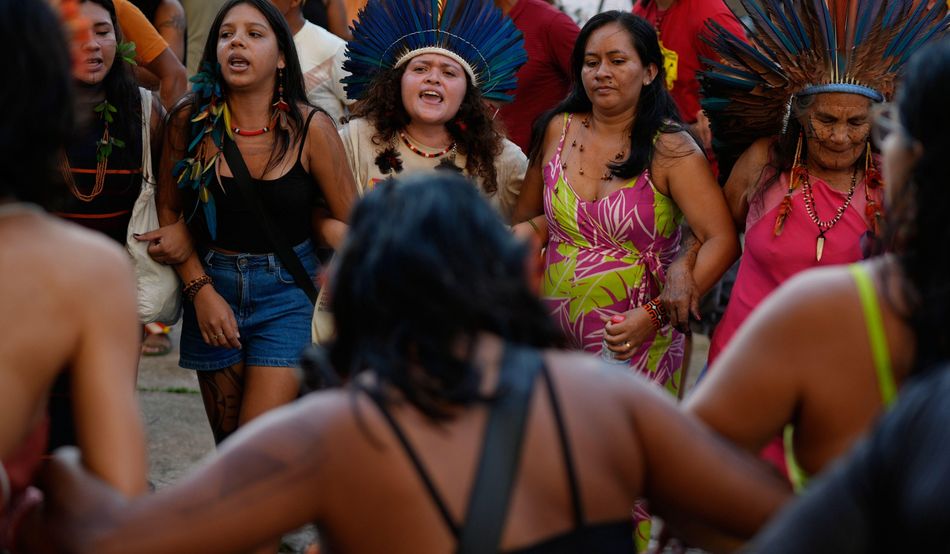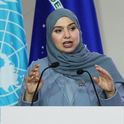It didn’t bode well for Belém. Bill Gates undermined the UN climate conference, held in a city that is the gateway to the lower Amazon, with a Trump-appeasing essay before it had even begun. Swedish scientist Johan Rockström suggested delegates be “honest with the world and… declare failure” on the Paris 1.5 degree target. The president of Palau, an archipelago in the Western Pacific, said that “without the United States, China, or India committing [to that target], we really have no hope.” Even Christiana Figueres—recently described to me by one insider as “the Pope of climate change”—now says that climate progress is being led by economics, not diplomacy. So why did we bother with COP30?
In February 2023, shortly after COP27, the influential Club of Rome climate thinktank (members include former UN secretary general Ban Ki-moon and former Irish president Mary Robinson) published an open letter decrying the annual COP as a “lethargic progress [now] at odds with climate science”. In 2024 the Club was compelled to write again, this time with a set of seven requests. Among them was a suggestion to move away from the annual COP format to “smaller, more frequent, solution-driven meetings”. Figueres was among the signatories. The subtext was that the 2015 Paris agreement had been the logical culmination of 21 years of talks—and what was needed now was “a fundamental overhaul of the COP… a shift from negotiation to implementation”.
Was that achieved in Belém? The phrase “from negotiation to implementation” certainly cropped up a lot: Brazil’s President Lula declared Belém the “COP of Implementation”. And there were flickers of hope in the first week, such as the Tropical Forests Forever Facility launched by Brazil to provide a permanent revenue stream for tropical forest conservation. But these flickers were snuffed out by week two, as the funding unravelled (“The Brazilians are fuming,” the Guardian reported). “At the moment, the incentives are not there for the leaders of the nations most responsible for climate change (namely the US) to actually make meaningful change,” says Matt Clark, of the University of Sydney.
This has left many feeling disillusioned. In Belém, Jose Luis Treviño Illsley of Debt for Climate, a Global South-led grassroots movement, tells me, “In all honesty, I do not know why we are going through this again. I believe the…COP has proven ineffective, exclusionary and hostile towards the people it should centre.” Those people included indigenous communities; UN security teams seem to have forgotten that the COP was hosted in the Amazon in part to be proximate to many of them.
A parallel People’s Summit, held outside of the UN restricted zone from 12th to 16th November, was more inclusive. It drew in more than 25,000 participants, the largest in the event’s 33-year history, and culminated in a climate justice march of 70,000 people, also the biggest demonstration of its kind at a COP. Maureen Santos, from the Summit’s political committee, told UN News: “this is what multilateralism is: when parties truly engage beyond states, and you see greater visibility for those suffering the impacts of the crisis, who also bring forward the alternatives to confront it.” Santos also praised the official COP hosts for supporting it. The president of COP30, Ambassador André Corrêa do Lago, gave a closing speech at the People’s Summit, also believed to be a first.
But could such an event be a viable alternative to COP, and a new forum where climate action could be implemented? Treviño Illsley of Debt for Climate thinks so. “A recurrent encounter like this one could also be a valuable alternative process to the COP,” he says. He also pointed to other alternatives such as the World Social Forum (an annual meeting of civil society organisations, first held in Brazil) and the binding instrument on transnational corporations and human rights, a treaty proposed by the UN Human Rights Council to regulate the activities of international businesses and hold them accountable for human rights abuses, which is now in round 11 of negotiations. Still, it is unclear how the legal detail that is negotiated and decided at COPs could be replicated in such a parallel system.
Thalita Silva, a programme coordinator for the Global Fund for Children’s Climate Justice and Youth in Brazil, told me that the COP process only works “if we recognise that the real strength of climate action does not come from negotiation rooms, but from the streets… Supporting youth and grassroots communities is a political responsibility.” An alternative model, she said, “is not about replacing COP, but redistributing its architecture: decentralised decision-making… and direct, simplified funding for grassroots actors.”
The Club of Rome also took part in the parallel conference. Sandrine Dixson-Declève, honorary president, updated me shortly afterwards: “The low-hanging fruit is being addressed,” she said. “Both the UNFCCC… and the Brazilian presidency [of COP] have importantly recognised the need to address COP renewal”. A roundtable will address the treaty signatories’ concerns and recommendations. And despite it being “a difficult time to actually get change due to the bullying tactics of the US and the games being played by the Saudis and Russians,” she believes there was progress towards streamlining and speeding up the COP process. One positive sign: 20,000 fewer people attended Belém than bloated Baku a year ago. This, she says, is largely a good thing—a sign of spreading out—albeit also signifying the loss of certain delegations, including the US.
The whole point of COP, of course, is to reduce global emissions. And no matter how inclusive or not the COP process is, the world is not on track. “We are not where we need to be on this,” says Dixson-Declève. The 119 Nationally Determined Contributions (NDCs)—the climate action plans submitted by each country under the Paris agreement “are very weak,” she says, “covering 75.8 per cent of global emissions but [committing to] actions that are still 43 per cent of what we need.” She laments the time and energy spent by scientists and civil society simply keeping countries on-track with their current NDC commitments, let alone upping the ambition needed. “This for me is the most worrying development”. The Global Stocktake process, an assessment every five years of collective progress on climate action, “needs more teeth”, she says.
At the time of writing, COP30 has not yet drawn to a close. There is still hope for a final text wording that calls to “phase out fossil fuels”— incredibly, something that no COP to date, including Paris, has ever managed to achieve. It may be easier to do so this time, without the US in the room. That would be something.
The COP may be imperfect, but it does still deliver incremental change, pushing and prodding, nagging at national consciences. Even COP reformists aren’t calling for it to be scrapped altogether. “Given today’s tricky geopolitics, these efforts are important and needed”, argues Dixson-Declève. “Those of us who have called for a reformed COP all agree that in addition to answering our calls for reform we now have to be as strong in our calls to stick to multilateralism and climate diplomacy.”
See you at COP31, then, which it was announced on Thursday will be held in Turkey—another country Dixson-Declève worries isn’t “convinced by the urgency of climate action or fossil fuel phase-out”. One of the Club of Rome’s original seven reform requests was that it is only hosted by countries that show a “high level of ambition to uphold the goals of the Paris Agreement”—and Turkey’s is meek at best.
Perhaps the unifying argument here is that we should stop expecting so much from the annual COP. Paris gave us the target (1.5 degrees) and the means to achieve it (NDCs). Since then we’ve lost time, and we have likely missed that target—but we urgently need to get on with reducing emissions. These two weeks in November are too often seen as the chance to once again fire a starting pistol; in fact, they should be seen as the finishing line, where we compare times and training regimes, before going again.












